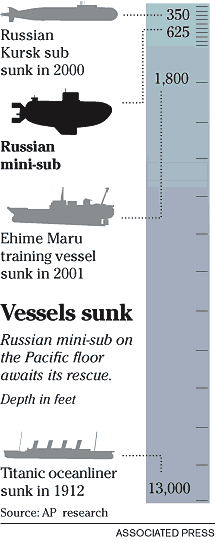Former sub pilot says
chances slim for crew
A former Russian submersible pilot who lives in Hawaii said yesterday that the seven crew members trapped inside a crippled Russian minisubmarine might face hypothermia along with a diminishing supply of oxygen.
 Because the thruster is not working, the batteries are not generating heat, said Sergei Chechin, a former pilot of a manned submersible similar to the 44-foot-long Priz, which was crippled after its propeller was caught on an underwater antenna Thursday off Russia's northeastern coast.
Because the thruster is not working, the batteries are not generating heat, said Sergei Chechin, a former pilot of a manned submersible similar to the 44-foot-long Priz, which was crippled after its propeller was caught on an underwater antenna Thursday off Russia's northeastern coast.
"It's getting colder and colder inside the pressure hull," said Chechin, who lives in Salt Lake. He estimated the temperature inside the steel-hulled vessel to be 40 degrees Fahrenheit.
Russian, U.S. and British forces were working yesterday and today to rescue the crew of the Priz from 600 feet beneath the surface off the Kamchatka Peninsula in the Pacific.
The Priz is carrying more than twice as many people than it should, Chechin said, adding that it is designed to hold three, not the seven aboard.
Chechin said this old-style sub has cells, which draw out carbon dioxide. The Russian Navy ought to know how many cells were taken and could easily calculate how much oxygen the crew has, he said.
Chechin disputed a Russian admiral's estimate yesterday that the crew had enough oxygen to last until Monday. "I'm sure it's not true," Chechin said. "They must know how much oxygen they have. First they said 24 hours, then 48."
Initial reports stated they had 24 hours of air. The admiral said today there was oxygen for 18 hours, then later said there is enough for more than 24 hours.
"The rescue effort is more a public relations effort than really effort to save lives," he said.
Based on information from a Russian newspaper article he read online, Chechin said he believes the Russian Navy waited too long before asking for international help.
"They needed to cover themselves," he said.
Five years ago, President Vladimir Putin drew widespread criticism for initially rejecting international assistance in rescue efforts for the Russian Navy sub Kursk, in which all 118 on board died.
"I wish they would come up alive," Chechin said of the Priz crew. "The chances are very slim they will survive."
As a civilian in the 1980s, Chechin piloted the same type of submarine for research.
E-mail to City Desk
[News] [Business] [Features] [Sports] [Editorial] [Do It Electric!]
[Classified Ads] [Search] [Subscribe] [Info] [Letter to Editor]
[Feedback]
